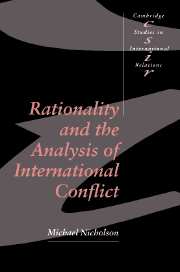Book contents
- Frontmatter
- Contents
- Preface
- Introduction: Rationality and the analysis of conflict
- PART I CONFLICT
- PART II RATIONAL BEHAVIOUR
- 3 RATIONALITY AND CONFLICT
- 4 CONFLICT AND THE PARADOXES OF RATIONALITY
- 5 THE ZERO-SUM GAME: SOLUTIONS AND INTERPRETATIONS
- 6 EMOTION AND RATIONALITY
- 7 INTERNATIONAL CRISES: THE WARPING OF RATIONALITY
- RATIONAL BEHAVIOUR AND RATIONAL CHOICE: AN ASSESSMENT
- PART III RATIONAL BELIEF: SOME TOPICS IN CONFLICT ANALYSIS
- PART IV CONCLUSION
- References
- Index
- Titles in the series
7 - INTERNATIONAL CRISES: THE WARPING OF RATIONALITY
Published online by Cambridge University Press: 24 November 2009
- Frontmatter
- Contents
- Preface
- Introduction: Rationality and the analysis of conflict
- PART I CONFLICT
- PART II RATIONAL BEHAVIOUR
- 3 RATIONALITY AND CONFLICT
- 4 CONFLICT AND THE PARADOXES OF RATIONALITY
- 5 THE ZERO-SUM GAME: SOLUTIONS AND INTERPRETATIONS
- 6 EMOTION AND RATIONALITY
- 7 INTERNATIONAL CRISES: THE WARPING OF RATIONALITY
- RATIONAL BEHAVIOUR AND RATIONAL CHOICE: AN ASSESSMENT
- PART III RATIONAL BELIEF: SOME TOPICS IN CONFLICT ANALYSIS
- PART IV CONCLUSION
- References
- Index
- Titles in the series
Summary
THE NATURE OF INTERNATIONAL CRISES
From time to time, there are crises in the international system – periods when the issues of war and peace appear paramount and where the prospect of war creeps out of the history books and appears a present reality. People watch each news bulletin, and snatch nervously at their newspapers to see whether an impending cataclysm has approached or receded. By its nature, an international crisis represents some deviation from the normal pattern of international behaviour. It is nevertheless a particularly important type of event. It is often these periods of international trauma that trigger off war, and from which new patterns of behaviour emerge or old ones are consolidated. They are not the norm, but they have important consequences, including war, and have therefore been the object of a great deal of study. Decisions in crises also raise further problems in the discussion of rationality.
One of the worrying things about crises is that, while on some occasions people seem to behave with commendable coolness and sense, on others they clearly do not. At precisely the moment when rational assessment and rational decision should be paramount, such procedures are particularly under threat. The crisis of 1914 is often held up with scorn as a case where apparently reckless men plunged the world into the most appalling suffering, whereas, so it would appear, a little common sense would have avoided a great deal of bother.
- Type
- Chapter
- Information
- Rationality and the Analysis of International Conflict , pp. 120 - 137Publisher: Cambridge University PressPrint publication year: 1992
- 1
- Cited by



